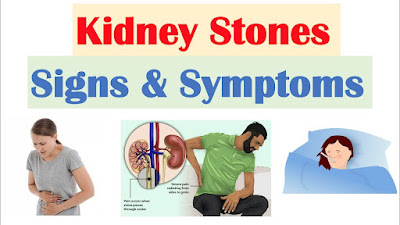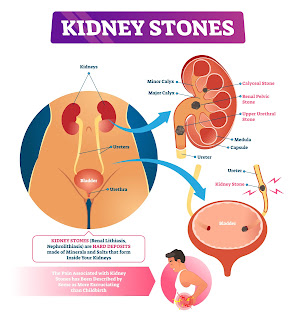Kidney stone symptoms
Kidney stones, also known as renal calculi, are hard, crystal-like deposits that form inside the kidneys. They can range in size from tiny grains of sand to larger, golf ball-sized stones. Kidney stones can be extremely painful and can cause complications if left untreated.
Symptoms of kidney stones can vary depending on the size and location of the stone. Some people with kidney stones may not experience any symptoms at all, while others may experience severe pain and discomfort. Here are some of the most common symptoms of kidney stones:
1: Sharp pain in the back, side, or lower abdomen: This is the most common symptom of kidney stones. The pain can be intermittent or constant and may come and go.
2: Painful urination: You may experience a burning sensation or pain when you urinate. You may also feel the urge to urinate frequently.
3: Blood in the urine: You may notice pink, red, or brown urine. This is caused by small amounts of blood being released from the kidney or urinary tract.
4: Nausea and vomiting: Some people with kidney stones may experience nausea and vomiting.
5: Fever and chills: If the kidney stone is causing an infection, you may experience fever and chills.
6: Difficulty passing urine: You may have difficulty passing urine if the stone is blocking the urinary tract.
7: Foul-smelling urine: You may notice a strong odor to your urine if you have a kidney stone.
It is important to note that some people may not experience any symptoms of kidney stones until the stone begins to move or block the urinary tract. In some cases, a small kidney stone may pass through the urinary tract without causing any pain or discomfort.
There are several factors that can increase your risk of developing kidney stones. These include:
1: Family history: If you have a family history of kidney stones, you are more likely to develop them.3: Dehydration: If you are not drinking enough fluids, you may be at an increased risk of developing kidney stones.
4: Diet: A diet that is high in sodium, sugar, and animal protein may increase your risk of developing kidney stones.
5: Obesity: Being overweight or obese can increase your risk of developing kidney stones.
6: Certain medical conditions: Certain medical conditions, such as gout, hyperparathyroidism, and urinary tract infections, can increase your risk of developing kidney stones.
If you suspect that you may have kidney stones, it is important to see a doctor as soon as possible. Your doctor can perform tests to confirm the presence of kidney stones and determine the size and location of the stones.
Treatment for kidney stones depends on the size and location of the stones. In some cases, small kidney stones may pass through the urinary tract without any treatment. However, larger kidney stones may require medical intervention.
Some common treatments for kidney stones include:
1: Pain management: Pain medication may be prescribed to manage the pain associated with kidney stones.2: Increased fluid intake: Drinking plenty of fluids can help flush the kidney stones out of the urinary tract.
3: Shock wave lithotripsy: This procedure uses shock waves to break up the kidney stones into smaller pieces, which can then be passed through the urinary tract.
4: Ureteroscopy: This procedure involves inserting a thin, flexible tube through the urethra and bladder to remove the kidney stones.
5: Surgery: In rare cases, surgery may be necessary to remove large kidney stones.
Prevention is key when it comes to kidney stones. Here are some tips to reduce your risk of developing kidney stones:
1: Drink plenty of fluids: Drinking plenty of fluids, especially water, can help prevent kidney stones from forming.2: Limit sodium and animal protein: A diet that is high in.
If you want to know more about health then read my whole page. Thank you.










0 टिप्पणियाँ